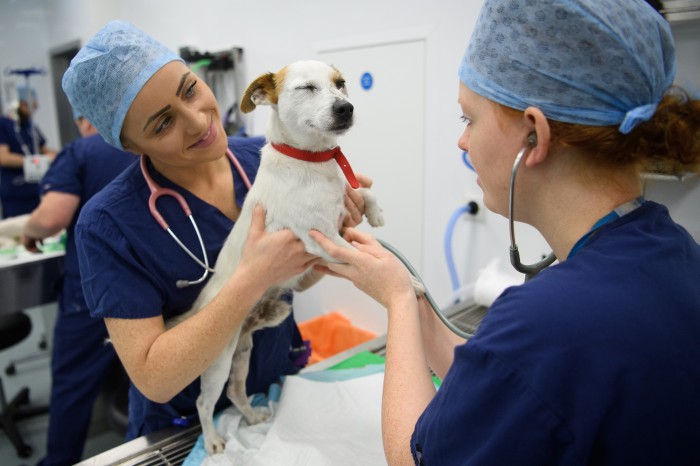Sick Dogs Could Be Key to Unlocking Mysteries of Immunotherapy
Novel cancer drugs that harness an individual’s own immune system to fight cancer are showing incredible promise in some patients, but researchers don’t fully understand why these immunotherapies work for some people and not others.
Scientists at the National Institutes of Health say they need animal models that imitate the human immune system to study the effects of these drugs. This week an advisory committee at the National Cancer Institute at NIH said it will start a new program in 2017 to study experimental immunotherapies in dogs with cancer. The National Cancer Institute has been performing studies in dogs since 2003 with other cancer therapies, but this is the first large-scale dog immunotherapy effort the institute is supporting.

Five grants totaling $15 million over five years will be available to fund investigators at cancer centers, which will partner with veterinary colleges to carry out the trials, says Toby Hecht, associate director of the translational research program at the National Cancer Institute. Researchers hope the trials will provide an accurate animal model for how these therapies work in humans.
Some pharmaceutical companies and other research groups have already reported early success in using immunotherapy to treat cancer in dogs.
“Dogs get cancers very similarly to humans,” Hecht says. They share some of the same cancer-causing genetic mutations, and as life expectancy in dogs and people has increased, both have experienced a rise in cancer rates. Mouse models are used to study many diseases, but they aren’t able to evaluate immunotherapy response in humans because their immune systems are so different and their tumors are not as genetically complex as those in people.
Immunotherapy drugs are designed to essentially unleash the brakes on the immune system, disabling biological signals that cancer cells have exploited to go undetected in the body. Several immunotherapies have been approved by the U.S. Food and Drug Administration, and hundreds of clinical trials are currently testing immunotherapies in humans. Earlier this week, Gary Gilliland, president and director of the Fred Hutchinson Cancer Research Center, said at an event in Washington, D.C., that his institution has made a commitment to deliver curative immunotherapies for most cancer types within 10 years.
Last year, the National Cancer Institute awarded funding to eight cancers centers to join forces with veterinary colleges to sequence at least 25 canine tumors across six different types of cancers—B-cell lymphoma, melanoma, bladder cancer, osteosarcoma, glioma, and mammary cancer. Hecht says there was so much interest—a total of 17 research applications were received—that the National Cancer Institute decided to start a program to continue that work.
It plans to announce the request for research proposals at the beginning of 2017 and award funding to the selected projects by September 2017.
Hecht says she hopes the canine trials will attract interest from pharmaceutical companies that are developing immunotherapies. Once the studies are done, all the data generated will be made available in a public online database as a resource for researchers.
Keep Reading
Most Popular
Large language models can do jaw-dropping things. But nobody knows exactly why.
And that's a problem. Figuring it out is one of the biggest scientific puzzles of our time and a crucial step towards controlling more powerful future models.
The problem with plug-in hybrids? Their drivers.
Plug-in hybrids are often sold as a transition to EVs, but new data from Europe shows we’re still underestimating the emissions they produce.
Google DeepMind’s new generative model makes Super Mario–like games from scratch
Genie learns how to control games by watching hours and hours of video. It could help train next-gen robots too.
How scientists traced a mysterious covid case back to six toilets
When wastewater surveillance turns into a hunt for a single infected individual, the ethics get tricky.
Stay connected
Get the latest updates from
MIT Technology Review
Discover special offers, top stories, upcoming events, and more.